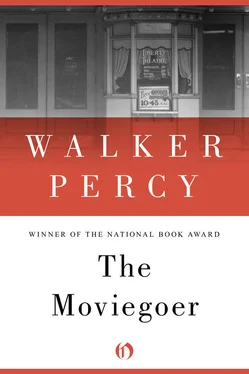Walker Percy - The Moviegoer
Здесь есть возможность читать онлайн «Walker Percy - The Moviegoer» весь текст электронной книги совершенно бесплатно (целиком полную версию без сокращений). В некоторых случаях можно слушать аудио, скачать через торрент в формате fb2 и присутствует краткое содержание. Год выпуска: 2011, Издательство: Open Road Media, Жанр: Современная проза, на английском языке. Описание произведения, (предисловие) а так же отзывы посетителей доступны на портале библиотеки ЛибКат.
- Название:The Moviegoer
- Автор:
- Издательство:Open Road Media
- Жанр:
- Год:2011
- ISBN:нет данных
- Рейтинг книги:5 / 5. Голосов: 1
-
Избранное:Добавить в избранное
- Отзывы:
-
Ваша оценка:
- 100
- 1
- 2
- 3
- 4
- 5
The Moviegoer: краткое содержание, описание и аннотация
Предлагаем к чтению аннотацию, описание, краткое содержание или предисловие (зависит от того, что написал сам автор книги «The Moviegoer»). Если вы не нашли необходимую информацию о книге — напишите в комментариях, мы постараемся отыскать её.
The Moviegoer — читать онлайн бесплатно полную книгу (весь текст) целиком
Ниже представлен текст книги, разбитый по страницам. Система сохранения места последней прочитанной страницы, позволяет с удобством читать онлайн бесплатно книгу «The Moviegoer», без необходимости каждый раз заново искать на чём Вы остановились. Поставьте закладку, и сможете в любой момент перейти на страницу, на которой закончили чтение.
Интервал:
Закладка:
“Well well well. Trader Jack. So you slipped up on your plane reservations too.”
“Hello, Sidney, Margot. This is Kate Cutrer.”
Margot becomes very friendly, in the gossipy style of the Mississippi Delta.
“So you forgot about it being Mardi Gras and couldn’t get a plane.”
“No, we like the train.”
Sidney is excited, not by the trip as I am, but by the convention. Leaning across the aisle with a program rolled up in his hand, he explains that he is scheduled for a panel on tax relief for bond funds. “What about you?”
“I think I am taking part in something called a Cracker Barrel Session.”
“You’ll like it. Everybody talks right off the top of their head. You can take your coat off, get up and stretch. Anything. Last year we had this comical character from Georgia.” Sidney casts about for some way of conveying just how comical and failing, passes on without minding. “What a character. Extremely comical. What’s the topic?”
“Competing with the variable endowments.”
“Oh yass,” says Sidney with a wry look of our trade. “I don’t worry about it.” He slides the cylinder of paper to and fro. “Do you?”
“No.”
Sidney suggests a bridge game, but Kate begs off. The Grosses move to a table in the corner and start playing gin rummy.
Kate, who has been fumbling in her purse, becomes still. I feel her eyes on my face.
“Do you have my capsules?”
“What?”
“My capsules.”
“Why yes, I do. I forgot that I had them.”
Not taking her eyes from my face, she receives the bottle, puts it in her purse, snaps it.
“That’s not like you.”
“I didn’t take them.”
“Who did?”
“Sam gave them to me. It was while I was in the hammock. I hardly remember it.”
“He took them from my purse?”
“I don’t know.”
For a long moment she sits, hands in her lap, fingers curling up and stirring a little. Then abruptly she rises and leaves. When she returns, her face is scrubbed and pale, the moisture still dark at the roots of her hair. What has upset her is not the incident of the capsules but meeting the Grosses. It spoils everything, this prospect of making pleasant talk, of having a delightful time, as Sidney would put it (“There we were moping over missing the plane, when Jack Bolling shows up and we have ourselves a ball”) — when we might have gone rocking up through dark old Mississippi alone together in the midst of strangers. Still she is better. Perhaps it is her reviving hope of losing the Grosses to gin rummy or perhaps it is the first secret promise of the chemicals entering her blood.
Now, picking up speed, we gain the swamp. Kate and I sway against each other and watch the headlights of the cars on the swamp road, winking through the moss like big yellow lightning bugs.
The drowsiness returns. It is unwelcome. I recognize it as the sort of fitful twilight which has come over me of late, a twilight where waking dreams are dreamed and sleep never comes.
The man next to me is getting off in St Louis. When the conductor comes to collect our tickets, he surrenders a stub: he is going home. His suit is good. He sits with his legs crossed, one well-clad haunch riding up like a ham, his top leg held out at an obtuse angle by the muscle of his calf. His brown hair is youthful (he himself is thirty-eight or forty) and makes a cowlick in front. With the cowlick and the black eyeglasses he looks quite a bit like the actor Gary Merrill and has the same certified permission to occupy pleasant space with his pleasant self. In ruddy good health, he muffles a hearty belch in a handkerchief. This very evening, no doubt, he has had an excellent meal at Galatoire’s, and the blood of his portal vein bears away a golden harvest of nutrient globules. When he first goes through his paper, he opens it like a book and I have no choice but to read the left page with him. We pause at an advertisement of a Bourbon Street nightclub which is a picture of a dancer with an oiled body. Her triceps arch forward like a mare’s. For a second we gaze heavy-lidded and pass on. Now he finds what he wants and folds his paper once, twice and again, into a neat packet exactly two columns wide, like a subway rider in New York. Propping it against his knee, he takes out a slender gold pencil, makes a deft one-handed adjustment, and underlines several sentences with straight black lines (he is used to underlining). Dreaming at his shoulder, I can make out no more than
In order to deepen and enrich the marital—
It is a counseling column which I too read faithfully.
The train sways through the swamp. The St Louisan, breathing powerfully through the stiff hairs of his nose, succeeds in sitting in such a manner, tilted over on his right hip and propped against himself, that his thigh forms a secure writing platform for the packet.
The voices in the car become fretful. It begins to seem that the passengers have ridden together for a long time and have developed secret understandings and old grudges. They speak crossly and elliptically to each other.
Staying awake is a kind of sickness and sleep is forever guarded against by a dizzy dutiful alertness. Waking wide-eyed dreams come as fitfully as swampfire.
Dr and Mrs Bob Dean autograph copies of their book Technique in Marriage in a Canal Street department store. A pair of beauties. I must have come in all the way from Gentilly, for I stand jammed against a table which supports a pyramid of books. I cannot take my eyes from the Deans: an oldish couple but still handsome and both, rather strangely, heavily freckled. As they wait for the starting time, they are jolly with each other and swap banter in the professional style of show people (I believe these preliminaries are called the warm-up). “No, we never argue,” says Bob Dean. “Because whenever an argument starts, we consult the chapter I wrote on arguments.” “No, dear,” says Jackie Dean. “It was I who wrote the chapter—” etc. Everyone laughs. I notice that nearly all the crowd jamming against me are women, firm middle-aged one-fifty pounders. Under drooping lids I watch the Deans, peculiarly affected by their routine which is staged so effortlessly that during the exchange of quips, they are free to cast business-like looks about them as if no one were present. But when they get down to business, they become as sober as Doukhobors and effuse an air of dedicated almost evangelical helpfulness. A copy of the book lies open on the table. I read: “Now with a tender regard for your partner remove your hand from the nipple and gently manipulate—” It is impossible not to imagine them at their researches, as solemn as a pair of brontosauruses, their heavy old freckled limbs about each other, hands probing skillfully for sensitive zones, pigmented areolas, out-of-the-way mucous glands, dormant vascular nexuses. A wave of prickling passes over me such as I have never experienced before.
My head, nodding like a daffodil, falls a good three inches toward the St Louisan before it jerks itself up. Kate sits shivering against me, but the St Louisan is as warm and solid as roast beef. As the train rocks along on its unique voyage through space-time, thousands of tiny thing-events bombard us like cosmic particles. Lying in a ditch outside is a scrap of newspaper with the date May 3, 1954. My Geiger counter clicks away like a teletype. But no one else seems to notice. Everyone is buried in his magazine. Kate is shaking like a leaf because she longs to be an anyone who is anywhere and she cannot.
The St Louisan reads a headline
SCIENTIST PREDICTS FUTURE IF
NUCLEAR ENERGY IS NOT MISUSED
Out comes the gold pencil to make a neat black box. After reading for a moment he comes back to the beginning and is about to make a second concentric box, thinks better of it, takes from his pocket a silver knife, undoes the scissors and clips the whole article, folds it and places it in his wallet. It is impossible to make out any of the underlined passages except the phrase: “the gradual convergence of physical science and social science.”
Читать дальшеИнтервал:
Закладка:
Похожие книги на «The Moviegoer»
Представляем Вашему вниманию похожие книги на «The Moviegoer» списком для выбора. Мы отобрали схожую по названию и смыслу литературу в надежде предоставить читателям больше вариантов отыскать новые, интересные, ещё непрочитанные произведения.
Обсуждение, отзывы о книге «The Moviegoer» и просто собственные мнения читателей. Оставьте ваши комментарии, напишите, что Вы думаете о произведении, его смысле или главных героях. Укажите что конкретно понравилось, а что нет, и почему Вы так считаете.












